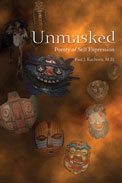"So as it has ended,
I find life anew.
It's placed in my sinews
it's placed in my love.
Compassion is power,
the order of things,
I open my mesa
to let my life begin."

 |
Unmasked: Poetry of Self Expression by Paul J. Kachoris, M.D. Lulu
book review by John E. Roper
The saying "Physician, heal thyself," is a frequently used admonition for medical professionals as well as for others who are involved in ministering to the physical or emotional needs of the people in their care. It is a call for self-assessment, for when we understand ourselves better we are more qualified to relate to and help those we encounter. As a practicing clinical psychiatrist with over forty years of experience in his field, the author has come to realize over the course of his career that he is a "wounded healer" who, just like his patients, is struggling to find his way in the world. Since adolescence, the writing of poetry has proven to be therapeutic for him; and so, in the hope that perhaps his poems can positively impact the hearts of others, he has chosen to "unmask" himself by exploring the deep emotions that all of us share.
Inspired by the collection of twenty-five masks that adorn the walls of his consultation office, Kachoris has grouped his poems into nine categories of affective/feeling "facets." These range from the ones we perceive as primarily negative such as terror and sorrow to the more positive feelings of joy and love. For example, in his piece, "Hollow," the poet writes about an encounter between two people that is polite but devoid of feelings, even though for at least one of the participants there had been a time in the past where an intense love had raged for the other person. The emptiness of the meeting leaves the focal character crying for hours afterward. Placed under the "Fear, Terror" category, the poem reflects how frightened all of us are deep inside of losing an emotional connection with a loved one. Similarly, in "Oh Johnny, My Boy" from the "Sadness, Sorrow" section, every reader can empathize on some level with the grief a grandfather feels for his son's loss of his own baby boy and for the opportunities at fatherhood his adult child will now miss. Yet even in these darker sections Kachoris sometimes interjects a glimmer of hope and a resolution to survive and triumph over life's circumstances. For instance, in "The Golden Path" from his "Shadow" category, the narrator defies the inner demons who seek to devour him and instead chooses to hang on to his dreams.
Despite being collected under sections entitled "Joy, Happiness" or "Agape, Love," Kachoris' offerings in the positive categories are never fluffy, warm and fuzzy poems revolving around subjects like puppies or flowers. Instead, they deal with topics such as love and forgiveness that finally emerge at the poet's father's grave like in "My Final Release." No matter which grouping his poems fall under, however, the author's poetry exudes a vitality and depth of feeling that is often lacking in the works of many contemporary poets. In some ways Kachoris' verse harks back to the emotional rawness of Edgar Allen Poe's poems as seen in "Annabel Lee" or "To One in Paradise" but without the reliance on rhyme. In other ways his frequent use of classical mythology and archetypes is reminiscent of the works of T.S. Eliot, although Kachoris' poetry is shorter and easier to unpack than poems such as "The Hollow Men" and "The Wasteland."
Unmasked was a finalist for The Montaigne Medal, an honor given under the auspices of the Eric Hoffer Award for most thought-provoking books. Indeed the content of Kachoris' excellent poetry collection provides the reader with food for thought.
RECOMMENDED by the US Review